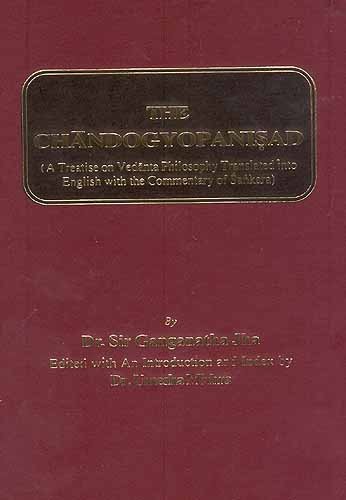Chandogya Upanishad (Shankara Bhashya)
by Ganganatha Jha | 1942 | 149,749 words | ISBN-10: 8170842840 | ISBN-13: 9788170842842
This is the English translation of the Chandogya Upanishad, an ancient philosophical text originally written in Sanksrit and dating to at least the 8th century BCE. Having eight chapters (adhyayas) and many sub-sections (khandas), this text is counted among the largest of it's kind. The Chandogya Upanishad, being connected to the Samaveda, represen...
Section 7.25 (twenty-fifth khaṇḍa) (two texts)
Upaniṣad text:
That itself is below, That above, That behind, That before, That to the right, That to the left. That itself is all this. Next follows the teaching through the notion of ‘I’:—‘I’ itself is below, I above, I behind, I before, I to the right, I to the left; the ‘I’ is all this.—(1)
Commentary (Śaṅkara Bhāṣya):
It is explained why the Infinite is not based upon anything. Because it is the Infinite Itself which is below,—and there is nothing else apart from It, which is below it,—upon which It would rest. Similarly, It is above etc., etc.,—as above. If there existed something apart from the Infinite, then alone could the Infinite rest upon something else;—as a matter of fact, however, there is nothing apart from the Infinite; the Infinite Itself is all; hence, it follows that the Infinite does not rest upon anything.
In view of the assertion- wherein one seeśnothing else,—which implies the idea of container and contained; and the present assertion ‘That is below’,—which appears to refer to something not before the eyes of the speaker, and is something different,—it would give rise to the idea in some one’s mind that the Infinite is something different from the perceiving the Living Self; in order to preclude the possibility of such an idea arising, there follows the teaching through the notion of ‘I’; which shows that the Infinite is non-different from the Perceiver; and it Cis the Infinite Itself which is spoken of as ‘I’ being below etc., etc.—(1).
Upaniṣad text:
Now follows the teaching through Self. The Self itself is below, the Self above, the Self behind, the Self before, the Self to the right, the Self to the left: the Self is all this. One who sees thus, reflects thus and understands thus, loves the Self, revels with the Self, enjoys the company of the Self, and rejoices in the Self, he becomes the ‘Self-sovereign’ (or King of Heaven) he becomes free to do what he pleases, in all regions; while those that know otherwise than this are ruled by others, and live in perishable regions, and they are not free to do what they please, in all regions.—(2)
Commentary (Śaṅkara Bhāṣya):
People lacking in discrimination speak of the aggregate of the body and other things (sense-organs etc., etc.), as ‘I’; in order to set aside this notion (that the notion of ‘I’ through which the Infinite has been explained refers to the body),—now follows the teaching through Self (which is really what the notion of ‘I’ stands for); that is, the Infinite is now going to be described through the Self Itself, in the form of Pure Being. ‘It is Self Itself that is all everywhere’.—the wise man who sees this One, unborn, all-pervading, like Ākāśa, full, without a second,—and having seen It, reflects upon It and understands It,—he comes to love Self;—i.e. has all his love, affection, joy, centered in the Self,—so also he revels with the Self; ‘love’ ‘rati’ stands for what is carried on which the body alone, while ‘Real’ krīḍā, stands for what is carried on through external means entirely; as is clear from the use of the root ‘krīḍā’ to ‘revel which is used in the world in connection with one’s wives and friends;—it is not so for the wise man; for him both these (‘love’ and ‘revelling’) are brought about by his knowledge of the Self.—The enjoyment of company—is pleasure due to the companionship of two persons,—this also for the wise, is independent of duality (the second person). Similarly, he rejoices in the Self; for the Ignorant, there rejoicing due to sound and other objects, not so for the wise, for whom, all rejoicing, at all times and in all ways is due to the Self alone,—it is not due to such agencies as the body, the physical-life and experiences, and is entirely independent of all external things. The knowing man who is as described becomes the Self-Sovereign even while he is still alive, and also when his body dies, he becomes the Self-Sovereign (or King of Heaven). And inasmuch as he becomes all this, he becomes free to do as he pleases, in all regions.
The ‘freedom to act as he pleases’ that has been spoken of, in connection with the ‘Spirit’ and other stages,—has been with reference to the restricted spheres specially mentioned therein; and the fact being subject to the rule of others was a logical implication, from the fact that there were still higher degrees of freedom etc.,—while what is done in the present context is that reference is made to the freedom of action and self-sovereignty as suggested by the circumstances of the case and then the cessation of those restricted grades of freedom etc., is stressed, by means of such expressions as ‘he becomes the Self-Sovereign’.
While those that know otherwise than this,—i.e. who entertain notions contrary to the one herein declared,—or who have not rightly understood the view herein propounded,—are ruled by others,—i.e. one such as have other persons for their ruler, and also live in perishable regions; we have already explained that notions of diversity appertain to the Finite, and the Finite is ‘mortal \ Hence, it follows that those who hold to the idea of duality (diversity) live in perishable regions, in accordance with the character of their own ideas;—and for this same reason they are not free to do as they please, in all regions.—(2)
End of Section (25) of Discourse VII.
